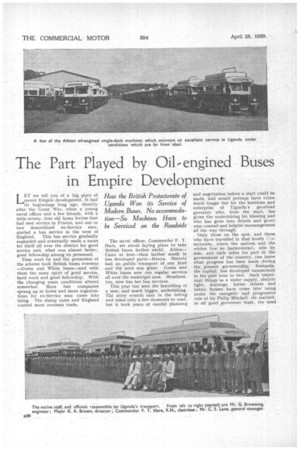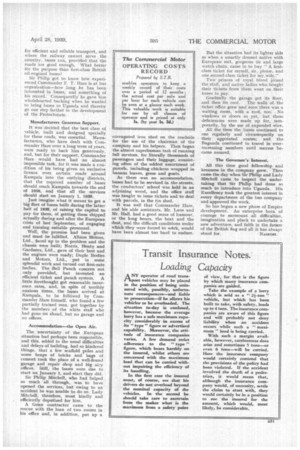The Part Played by Oil-engined Buses in Empire Development
Page 36

Page 37

If you've noticed an error in this article please click here to report it so we can fix it.
How the British Protectorate of Uganda Won its -Service of Modern Buses. No accommodation—So Machines Have to be Serviced on the Roadside LET me tell you of a big piece of recent Empire development. It had its beginnings long ago, directly after the Great War, when a young naval officer and a few friends, with a little money, four old Army lorries that had seen service in France, and one or two demobilized ex-Service men, started a bus service in the west of England. This bus service gradually expanded and eventually made a name for itself all over the district for good service and, what was almost bettez, good fellowship among its personnel.
Time went by and the promoters of the scheme took British buses overseas —Green and White buses—and with them the same spirit of good service,_ hard work and good fellowship. With the changing years conditions altered somewhat. More bus companies sprang up at home and more organizations for ex-Service men came into being. The slump came and England wanted more overseas trade. The naval officer, Commander F. T. Hare, set about laying plans to take British buses farther afield. Africa— Cairo at first—then farther. south in less developed parts—Kenya. Nairobi had no public transport of any kind and the need was great. Green and White buses now run regular services all over the municipal area. Mombasa, too, now has her bus services.
This year has seen the launching of a new, and much bigger, undertaking. The story sounds easy in the telling and takes only a few moments V-, read, but it took years of careful planning
and negotiation before a start could be made, and would perhaps have taken much longer but for the keenness and enterprise of Uganda's go-ahead goverrior who, from the start, has given the undertaking his blessing and who has gone into details and given wise counsel and helpful encouragement all the way through.
Only those on the spot, and those who have travelled in that lovely :27otectorate, where the natives and the whites live so harmonious:, side by side, and each takes his part in the government of the country, can know what progress has been made during the present governorship. Kampala, the capital, has developed enormously in the past year or two. Such important things as a water supply, electric light, drainage, better streets and better houses have come into being under the energetic and progressive rule of Sir Philip Mitchell. He realized. as all good governors must, the need for efficient and reliable transport, and where the railway cannot serve the country, buses can, provided that the roads are good enough. What better for the purpose than first-class British oil-engined buses?
Sir Philip got toknow how experienced Commander F. T. Hare is at bus organbation—how long he has been interested in buses, and something of his record. Consequently he gave him wholehearted backing when he wanted to bring buses to Uganda and thereby go one step farther in the development of the .Protectorate.
Manufacturers Generous Support.
It was decided that the best class of vehicle, built and designed specially for these roads, was essential. Manufacturers, who have dealt with Commander Hare over a long term of years,. were ready to back him generously, and, but for their support, Commander Hare would have had an almost impossible task, for it was made a condition of his being given an exclusive licence over certain roads around Kampala into the outlying districts, that the required number of buses should reach Kampala towards the end of 1938, and that all the services should start on January 1, 1939.
Just imagine what it meant to get a big fleet of buses built during the latter half of 1938, of raising the capital to pay for them, of getting them shipped actually during and after the European crisis of last September, of engaging and training suitable personnel.
Well, the promise had been given and must be fulfilled. Albion Motors. Ltd., faced up to the problem and the chassis were built; Norris, Henty and Gardners, Ltd., gave of their best and the engines were ready; Duple Bodies and Motors, Ltd., put in some splendid work and turned out first-rate bodies. The Bell Punch concern not only provided, but invented an efficient ticket and punch system. A little forethought got reasonable insurance rates, and, in spite of terribly anxious times, the buses arrived at Kampala, to be followed by Commander Hare himself, who found a few partially trained men, got together by the members of the white staff who had gone on ahead, but no garage and no offices.
Accommodation—the Open Air.
The uncertainty of the European situation had perhaps been responsible, and this, added to the usual difficulties and delays of building, had so hindered things, that a few scaffold poles and some heaps of bricks and bags of cement took the place of a well-found garage and repair shop and big airy offices. Still, the buses were due to start on January 1, and start they did.
Sir Philip Mitchell, who had helped so much all through, was to have opened the servicoes, but owing to an accident he was unable to do so. Lady Mitchell, therefore, most kindly and efficiently deputized far him.
A Goan contractor came to the rescue with the loan of two rooms in his office and, in addition, put up a corrugated iron shed on the roadside for the use of the chairman of the company and his helpers. Then began the almost superhuman task of running full services, for literally thousands of passengers and their luggage, consisti-ng often of the oddest assortment of parcels, including chickens wrapped in banana leaves, geese and goats.
As there was no accommodation, buses had to he serviced in the streets, the conductors' school was held in an adjoining wood, and the office staff was taught to issue tickets and to deal with parcels, in the tin shed.
It was well that Commander Hare, and his able assistants, Mr. Lane and Mr. Hall, had a good sense of humour, or the long hours, the heat and the dust, and the difficult conditions under which they were forced to witirk, would have been almost too hard to endure, But the situation had its lighter side as when a smartly dressed native with European suit, gorgeous tie and large watch chain, came in to buy " A firstclass ticket for myself, sir, please, and one second-class ticket for my wife."
Two princes of royal blood joined the staff, and native ladies who bought their tickets from them went on their knees to pay.
Gradually the garage got its floor, and then its roof. The walls of the ticket office grew and soon there was a waiting room, with a roof, too: No windows or doors as yet, but these deficiencies were made up for, temporarily, by the use of expanded wire.
All the time the buses continued to run regularly and circumspectly on their appointed routes; and the Buganda continued to travel in everincreasing numbers until success became assured.
The Governor's Interest.
All this time good fellowship and keenness in the company grew. Then came the day when Sir Philip and Lady Mitchell came to inspect the undertaking that Sir Philip had done so much to introduce into Uganda. His Excellency took the greatest interest in every department of the bus company and approved the work.
So has begun a new phase of Empire development. An enterprise born of courage to surmount all difficulties, imagination and pluck to undertake a new adventure, and faith in the future of the British flag and all it has always
stood for. NAIROBI.












































































